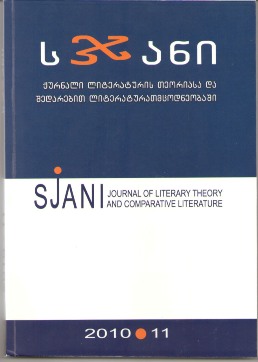მხატვრული და ეკონომიკური დისკურსის კორელაცია „ჯაყოს ხიზნების“ მიხედვით
Correlation between Artistic and Economic Discourse according to "Jaqo's Dispossessed"
Author(s): Nona KupreishviliSubject(s): Literary Texts
Published by: ლიტერატურის ინსტიტუტის გამომცემლობა
Keywords: correlation; economic discourse; modernistic project; activeness of consciousness; abour and religion
Summary/Abstract: The biographical facts of Mikheil Javakhishvili’s life evidence his professional interest and competence in economic issues. It is interesting to note that creative figure of this writer namely, abolishes recently established supposition according to which Georgian literature is regarded as means of generation mytho-poetic consciousness. A hitherto unusual tendency of Georgian youngsters going to European Universities to get “technical” rather than humanitarian education – in terms of changing cultural paradigm, was due to real state of Georgian socio-cultural environment at the beginning of the 20th century. M. Javakhishvili’s conceptual artwork Jaqo’s Dispossessed (1924), termed by the writer as the “groan of his own soul”, shows the correlation rate of artistic and economic discourse in his creative activity with particular clearness. We should bear in mind that Javakhishvili’s economic discourse is a constituent part of I.Chavchavadze’s “modernization project” (K.Katsitadze) which can be termed as a post period of the “creation of new Georgia in the depth of literature” (Z.Andronikashvili, G.Maisuradze). The questions which were put forward with all their acuteness in publicist letters by M.Javakhishvili and his contemporaries touched upon economics, as a form of culture, as the most important component in self-determination and realization of a new Georgian man. In his publisistic letters written in the 1920s Javakhishvili called for “reasonable moderateness” (“Oh, to those who only trade and ah, to those who only try to be chivalrous) which implied the balancing of social-political and national interests by the ancient and long-suffering country standing at the threshold of capitalism. In the letter “Small Man’s Small Thoughts”, the author emphasizes not only the creation of a new culture but indicates the force which can successfully implement the innovations: “Not corrupted feudal, not radical intelligentsia or socialist working people but called the third element - trade and industry”. Javakhishvili, after 17-year “rationalistic” (if we borrow his term) pause returned to Georgian writing. Unfortunately, this return coincided with the failure of reformist ideas forwarded by Illia and his generation. Just this painful process that was reflected in the novella Jaqo’s Dispossessed and those progressive advanced ideas which would be valuable for any other European country, humiliated and insulted, standing on the verge of nervous breakdown, that turned to be the subject of Teimuraz Khevistavi’s long monologues. The problems raised by Illia in his time: the antinomy of a nobleman and trader, town and village opposition, the agreement between national and capitalistic ethos, activization of relations between functional man and his work are much considered by M.Javakhishvili. It should be mentioned that the Jaqo’s Dispossessed wraps up the essence of the struggle of the advanced Georgian society between the 19th and 20th centuries.
Journal: სჯანი
- Issue Year: 2010
- Issue No: 11
- Page Range: 121-126
- Page Count: 6
- Language: Georgian

